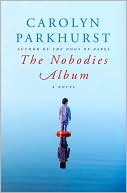 The Nobodies Album
The Nobodies Albumby Carolyn Parkhurst
Have you ever had the experience of starting a novel and just falling in love with the protagonist right away? This isn't that novel. When we meet first-person narrator Olivia Frost, the best-selling novelist is flying to New York to drop off her latest manuscript at her editor's office. She's a little quirky, a little acerbic. Walking through Times Square, she's stopped in her tracks by a news feed. Her estranged son, the rock star Milo Frost, has just been arrested for the murder of his girlfriend.
So begins Carolyn Parkhurst's latest, The Nobodies Album. It's part conventional murder mystery, part character study, and part rumination on the art and life of a novelist. For me, the book worked on all levels. I won't go so far as to call it a page-turner, but I was engaged by the mystery plot. The dénouement may have been obvious to some readers, but not to this one. I did warm up to Olivia and found her to be an interestingly complex character to build a novel around. But more than anything, I think, I enjoyed the insights into what it is to be a writer:
"I've often wondered if writers are the ones who feel compelled to narrate their lives as they live them, to stand in the shower and wonder whether there's a less predictable word than `lather.' I used to think it made me a good writer--look at me, honing my craft as I stand here to pour a cup of coffee, drafting and revising my descriptions of the mug, the smell, the sound of the hot splatter! Now I just find it tiresome, though it doesn't seem to be something I can stop. An end to narration: that's what I imagine death will be like."
Olivia isn't just ruminating on her writing, however. A significant subplot of the novel is her desire to rewrite the endings of all of her previously published works. (And I don't think you need to be Freud to see the significance in that.) To that end, scattered strategically throughout the novel (in order to create maximum tension and suspense) we are treated to the jacket copy and the original and revised conclusions to Olivia's seven novels. These interruptions are relatively short, and read more like self-contained stories than the true final pages of books, but the overall effect reminded me of Italo Calvino's experimental novel If on a Winter's Night a Traveler. Basically, you'd get caught up in the story snippets and feel slightly jarred when they ended.
Reading back over what I've written, I realize my description of this novel sounds a bit busy and overwrought. On the contrary, I thought it all came together really well. It was both entertaining and illuminating.
Oh, and Ms. Parkhurst, if you're reading this, I'd really like to read the entirety of Olivia's imaginary novel The Human Slice!
No comments:
Post a Comment